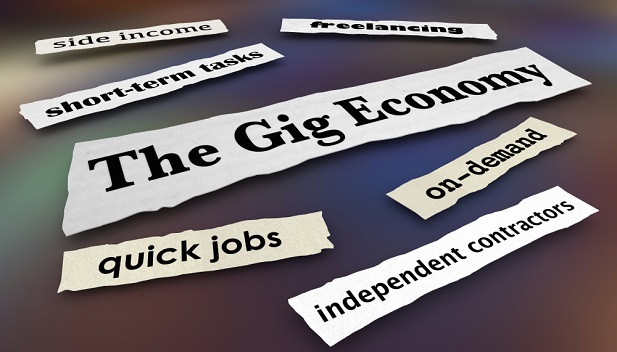 Half the workforce is expected to consist of freelancers by 2020, making it risky from a macroeconomic standpoint to have little to no safeguards. (Photo: Shutterstock)
Half the workforce is expected to consist of freelancers by 2020, making it risky from a macroeconomic standpoint to have little to no safeguards. (Photo: Shutterstock)
The recent passage of California's AB 5 invoked Abraham Lincoln's famous quote: "You can please some of the people all of the time; you can please all of the people some of the time; but you can't please all of the people all of the time."
The bill's passage will designate a large portion of the contingent workforce (which powers companies like Uber, Lyft and Postmates) as full-time employees. In the world's sixth largest economy, and directly affecting IPO darlings, this will see effects beyond the confines of California. Based on a 2018 California Supreme Court ruling involving delivery company Dynamex, it re-examines the lines that separate freelancers from FTEs. Now, a significant number of contractors will receive benefits (like insurance, paid vacation, disability and sick days) and be compliant with minimum wage laws. Additionally, AB 5 will end the regulatory arbitrage freelance platforms are trying to get away with.
Related: Newsom signs California's landmark gig labor bill, as court cases loom
At face value, this looks like a good thing for the workforce and economy, and in many ways it is. It takes seriously the idea that the labor market has changed (and is still changing), and needs new structures in place to protect workers and taxpayers. Half the workforce is expected to consist of freelancers by 2020, making it risky from a macroeconomic standpoint to have little to no safeguards. But it ignores the fact that not every freelancer wants employee status. There are people who very rightly should be classified as employees–people who work full-time for one platform in order to make rent and student loan payments, for example. Without this law they don't have options for basic protections like health care.
The call for change came about in the first place because of some business' contractor-based models being disadvantageous and opaque (like DoorDash's recent controversy over its tipping practices). But on closer look, reactions to this sweeping law–and predictions about what this means for the job market–are mixed.
For one, law ignores the diversity of the gig economy: there are freelancers that don't want to be classified as full-time employees (approximately 80 percent, according to a recent poll). There are a variety of reasons–some want to keep flexible hours, or want to grow a side hustle into a business of their own, and some like that they have a variety of clients. In other words, there is a large grey area between the black and white that is gig worker and FTE,, and different types need different protections. In refining this law, we need to be more surgical about how we view the problem.
We know the employers will feel the effects of this law, across industries–from large staffing firms to sole proprietorships–but not immediately. The reality is that it will be tied up in court before its implementation (Uber has already contested it). Businesses will also find loopholes (some based outside of California have cut out California-based freelancers to avoid the requirement). Others–particularly agencies–fear it will hurt their recruiting efforts.
In the meantime, the private sector has found opportunities in closing this gap. Startups like Honest Dollar and Trupo are helping businesses provide FTE benefits like retirement and disability, respectively, to contractors. Bento offers credit card services for SMB, and Qwil provides liquidity as a service to employers who need instant capital to more easily meet business demands (like meeting the demands of a big contract, or complying with minimum wage hikes, for example–an issue the small business world saw with the Obamacare mandates.).
Businesses should watch closely how this plays out in the job market, but in the meantime can take some educated guesses by watching how new policies play out in New York and Texas. New York declared revised compensation terms for individuals, requiring freelancers to be paid within 30 days under the Freelance Isn't Free Act. Earlier this summer, Texas redefined gig worker vs. an FTE, similar to AB 5.
It's clear that we'll continue to see these changes across the country. The fact is, the nature of how businesses operate and how people consume their services has changed dramatically over the last decade, and so we're still building the plane while flying it when it comes to policy. And that's OK–as long as we are learning from our mistakes and using their lessons to make work better. For everyone.
Johnny Reinsch is co-founder and CEO of Qwil, a California-based fintech startup that provides instant liquidity for gig workers and small businesses around the world. He began his career practicing corporate law, and has worked on both the FTE and freelancer sides of the fence.
Read more:
© Touchpoint Markets, All Rights Reserved. Request academic re-use from www.copyright.com. All other uses, submit a request to [email protected]. For more inforrmation visit Asset & Logo Licensing.






